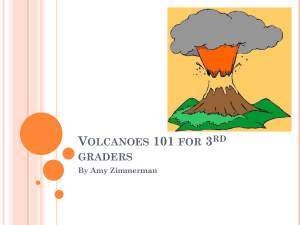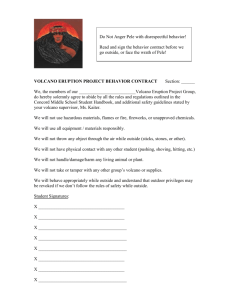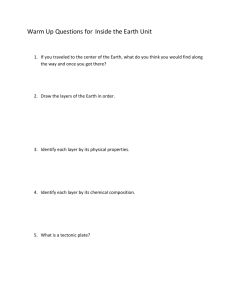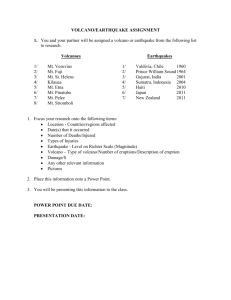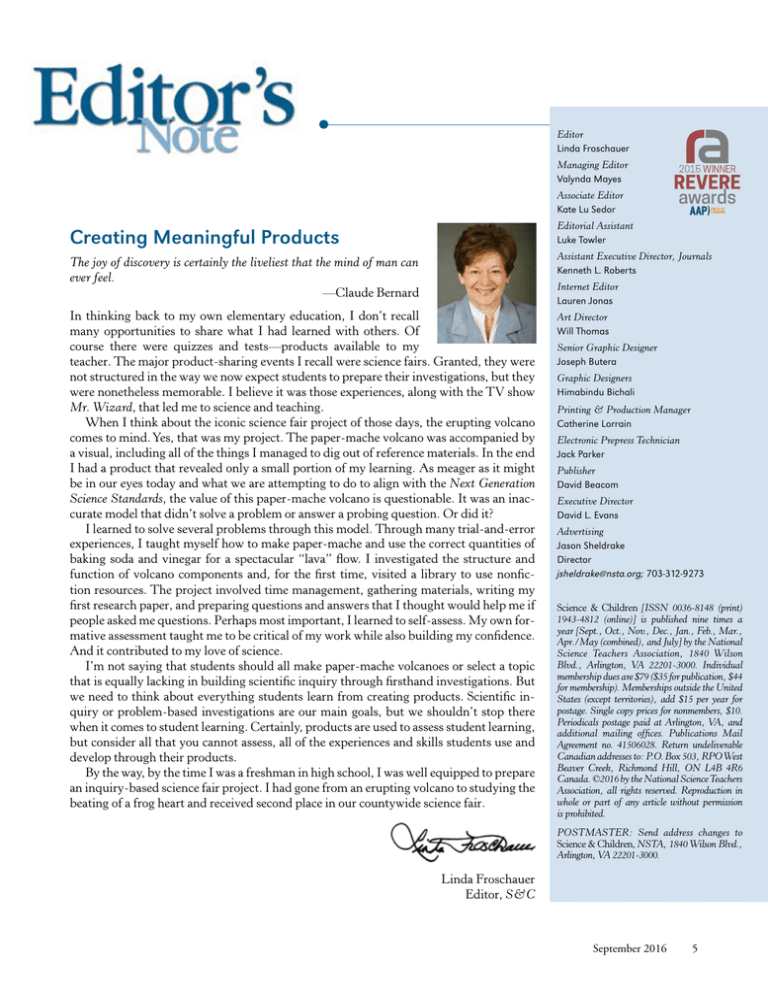
Editor
Linda Froschauer
Managing Editor
Valynda Mayes
Associate Editor
Kate Lu Sedor
Editorial Assistant
Luke Towler
Creating Meaningful Products
The joy of discovery is certainly the liveliest that the mind of man can
ever feel.
—Claude Bernard
Assistant Executive Director, Journals
Kenneth L. Roberts
In thinking back to my own elementary education, I don’t recall
many opportunities to share what I had learned with others. Of
course there were quizzes and tests—products available to my
teacher. The major product-sharing events I recall were science fairs. Granted, they were
not structured in the way we now expect students to prepare their investigations, but they
were nonetheless memorable. I believe it was those experiences, along with the TV show
Mr. Wizard, that led me to science and teaching.
When I think about the iconic science fair project of those days, the erupting volcano
comes to mind. Yes, that was my project. The paper-mache volcano was accompanied by
a visual, including all of the things I managed to dig out of reference materials. In the end
I had a product that revealed only a small portion of my learning. As meager as it might
be in our eyes today and what we are attempting to do to align with the Next Generation
Science Standards, the value of this paper-mache volcano is questionable. It was an inaccurate model that didn’t solve a problem or answer a probing question. Or did it?
I learned to solve several problems through this model. Through many trial-and-error
experiences, I taught myself how to make paper-mache and use the correct quantities of
baking soda and vinegar for a spectacular “lava” flow. I investigated the structure and
function of volcano components and, for the first time, visited a library to use nonfiction resources. The project involved time management, gathering materials, writing my
first research paper, and preparing questions and answers that I thought would help me if
people asked me questions. Perhaps most important, I learned to self-assess. My own formative assessment taught me to be critical of my work while also building my confidence.
And it contributed to my love of science.
I’m not saying that students should all make paper-mache volcanoes or select a topic
that is equally lacking in building scientific inquiry through firsthand investigations. But
we need to think about everything students learn from creating products. Scientific inquiry or problem-based investigations are our main goals, but we shouldn’t stop there
when it comes to student learning. Certainly, products are used to assess student learning,
but consider all that you cannot assess, all of the experiences and skills students use and
develop through their products.
By the way, by the time I was a freshman in high school, I was well equipped to prepare
an inquiry-based science fair project. I had gone from an erupting volcano to studying the
beating of a frog heart and received second place in our countywide science fair.
Art Director
Will Thomas
Internet Editor
Lauren Jonas
Senior Graphic Designer
Joseph Butera
Graphic Designers
Himabindu Bichali
Printing & Production Manager
Catherine Lorrain
Electronic Prepress Technician
Jack Parker
Publisher
David Beacom
Executive Director
David L. Evans
Advertising
Jason Sheldrake
Director
jsheldrake@nsta.org; 703-312-9273
Science & Children [ISSN 0036-8148 (print)
1943-4812 (online)] is published nine times a
year [Sept., Oct., Nov., Dec., Jan., Feb., Mar.,
Apr./May (combined), and July] by the National
Science Teachers Association, 1840 Wilson
Blvd., Arlington, VA 22201-3000. Individual
membership dues are $79 ($35 for publication, $44
for membership). Memberships outside the United
States (except territories), add $15 per year for
postage. Single copy prices for nonmembers, $10.
Periodicals postage paid at Arlington, VA, and
additional mailing offices. Publications Mail
Agreement no. 41506028. Return undeliverable
Canadian addresses to: P.O. Box 503, RPO West
Beaver Creek, Richmond Hill, ON L4B 4R6
Canada. ©2016 by the National Science Teachers
Association, all rights reserved. Reproduction in
whole or part of any article without permission
is prohibited.
POSTMASTER: Send address changes to
Science & Children, NSTA, 1840 Wilson Blvd.,
Arlington, VA 22201-3000.
Linda Froschauer
Editor, S&C
September 2016
5

